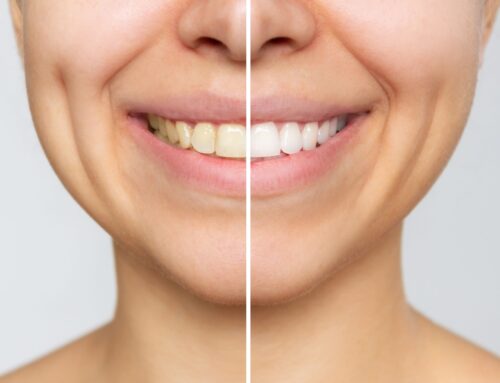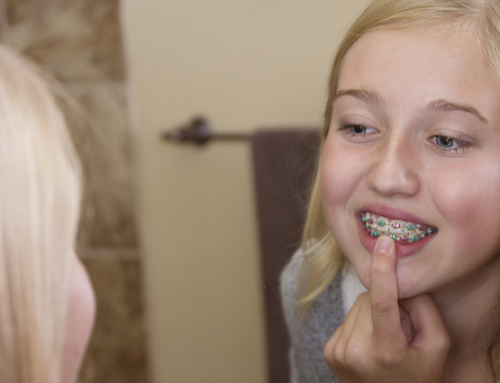9 Foods to Avoid for Healthy Teeth
Most of us are familiar with some of the basics of well-rounded nutritious eating. After all, we know that good food helps us maintain a strong and healthy body. But did you know that your diet also affects your oral health? Today, we’ll explain this, as well as how to maintain a tooth-friendly diet.
Let’s start with some basics. Why are healthy teeth important?
Healthy teeth are vital to maintaining a good quality of life. Strong healthy teeth help us chew, eat, swallow, talk, and even smile. When our teeth become damaged, all of these everyday things become that much more difficult to do.
Simply put, good oral health helps keep cavities and other painful oral conditions at bay.
What Do Healthy Teeth Look Like?
A set of healthy teeth will be strong, white-ish , and free of any cracks, chips, or holes. The gums meanwhile, should be firm, and light pink in appearance. The most important gauge of healthy teeth, however, will be not how they look, but how they feel.
Healthy teeth should feel good – meaning no wiggling, pain, or sensitivity. If you experience sudden pain when chewing or touching a tooth, chances are, there’s a cavity hiding somewhere in your mouth.
Foods to Avoid for Healthy Teeth
Everyone likes to watch what they eat, whether it be for themselves or their children. But did you know that what you eat also has an effect on the health of your teeth?
Certain foods can help feed the bacteria responsible for developing plaque or stains on your teeth. In contrast, other foods can break down your gums and tooth structure as enamel deteriorates when sugars or starch mix with the plaque.
Here are 9 foods and drinks to avoid or limit for healthy teeth and good oral health:
1. Soda
Although a very popular beverage among children, soda can cause serious problems for the health of your teeth. The sugar in the drink sits on your teeth and erodes tooth enamel. This erosion can cause tooth decay and cavities, and the chances are higher the more soda you drink!
Soda also contains acidic byproducts, in addition to the sugars, that can wear away and soften tooth enamel, leaving them vulnerable to plaque buildup and erosion.

2. Citrus Fruits and Juices

Citrus is loaded with citric acid, which is the number one cause of not only enamel erosion and tooth decay, but also cavities.
Researchers at the Eastman Institute for Oral Health discovered that drinking orange juice decreased the hardness of tooth enamel by 84%!
Fruits are a vital part of a healthy diet, but it’s essential to understand how some can affect your teeth. Acidic fruits, such as lemons, grapefruits, oranges, limes, pineapples, and grapes, are known for their high acid content. While refreshing and nutritious, the acids in these fruits can gradually wear down tooth enamel, increasing vulnerability to decay.
Managing the Effects on Your Teeth
Moderation is Key: Limit the amount of acidic or dried fruits you consume at one time.
Hydrate Wisely: Drink water after consuming these fruits. This simple action helps rinse away some of the acids and sugars left on your teeth.
Floss Diligently: Make flossing a habit after eating dried fruits to remove any remnants that may cling to your teeth.
Wait Before Brushing: Avoid brushing your teeth immediately after consuming acidic fruits. The enamel is more susceptible to abrasion right after exposure to acids. Wait at least 30 minutes to allow your saliva to naturally neutralize the acids.
By taking these simple steps, you can enjoy the benefits of fruity flavors while protecting your smile.
3. Coffee
The number one effect that coffee has on your teeth is that it creates surface stains. These stains can be hard to remove naturally, and certain whitening techniques can damage the enamel of your teeth, leaving them more prone to erosion and plaque buildup.
Depending on the type of coffee, and the amount of sugar you add, the drink can also contribute to the creation of acids in your mouth that will lead to tooth decay.
You may think of coffee as a harmless treat, but that’s not necessarily true. Many coffee shop chains offer tasty lattes and seasonal drinks such as mochas or pumpkin spice lattes. It’s important to recognize that these drinks are tasty because they’re filled with sugary syrups and powders.
In addition to tooth damage concerns, coffee can also lead to bad breath as it sticks to the tongue.
In addition to staining, coffee is naturally acidic, which can wear on your teeth’s enamel over time. This erosion makes your teeth vulnerable to decay and increases sensitivity. Depending on the type of coffee and the amount of sugar you add, the drink can also contribute to the creation of acids in your mouth that will lead to tooth decay.
Coffee contains tannins, molecules that cause color compounds to stick to your teeth, leading to further stains and discoloration. Furthermore, adding creamers and sugar can exacerbate these effects, similar to how sugary drinks impact your dental health.
To minimize these negative effects, consider drinking your coffee through a straw to reduce contact with your teeth. To mitigate damage to your teeth after drinking coffee, rinse your mouth with water and wait 30 minutes before brushing your teeth to allow your saliva time to neutralize the acidity of the coffee.
Brushing your teeth right after drinking it may also help mitigate potential damage, keeping your smile brighter and healthier.

4. Candy
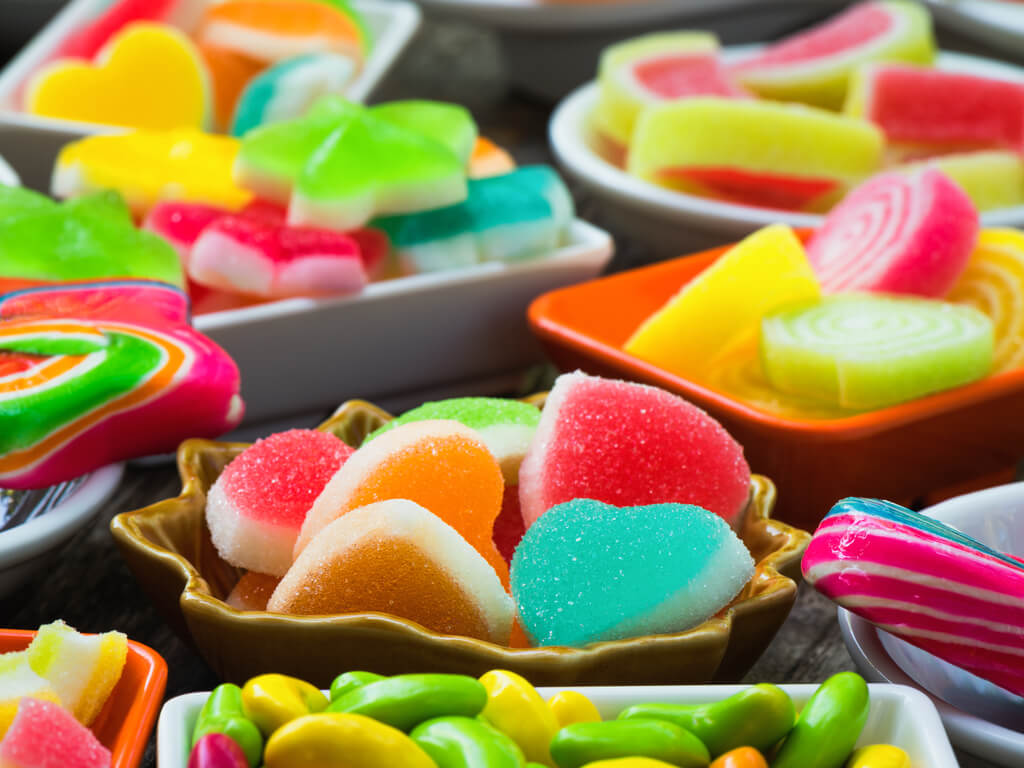
Lollipops, mints, and other hard candies expose teeth to sugar over a long period of time. Most of us like to chew on hard candies as well, which is something that can cause chips in teeth or even cracks, leaving a surface for plaque to build up.
Candy is loaded with sugar, which will combine with bacteria in your mouth to create acids and contribute to serious tooth decay. Sticky and chewy candies can also be a problem as they will get stuck in the crevices and spaces between your teeth. This prolonged exposure can also contribute to the formation of cavities and tooth decay. Candies that are high in both sugar and acidity, such as sour candies can bring further erosion and decay to your teeth.
If you do eat any type of candy, consider brushing your teeth to remove any of the sticky residue it can leave.
5. Starch-Based Products
Starch-based products like potato chips, bread, and crackers are bad for your teeth. These products are oftentimes lodged in between your teeth, allowing the food particles to linger and give plaque-causing bacteria something to hold on to. Furthermore, chips, bread, and other starch-based products can sometimes have as much sugar as candy.
The carbohydrates break down into simple sugars once you’ve eaten them, and these sugars will hang around your mouth after the starchy snack has been broken down. Then, just like with sugary drinks, bacteria feed off of the sugars and eat away at your teeth

6. Alcohol

Everyone knows that the consumption of alcohol is not particularly healthy. However, many people simply forget or don’t even realize that a side effect of consuming alcohol is a dried-out mouth. When your mouth is dried-out, you lack the necessary saliva to maintain adequate oral health.
Saliva helps keep your mouth saturated which prevents food build-up and rinses away leftover food particles. In addition, saliva contains proteins and minerals that preserve tooth enamel and defend against oral infections, gum disease, and tooth decay.
7. Chewing Ice
Who would have thought that ice should be a food to avoid when supporting oral health? Although ice is only made up of water and keeps your drink cool, it is not healthy to chew on.
Frequently chewing on ice can lead to damaged enamel and increase the risk of cracked, chipped, or broken teeth, as well as, loosening existing crowns. Additionally, further problems like tooth sensitivity and compromised fillings can arise from regularly chewing on ice.
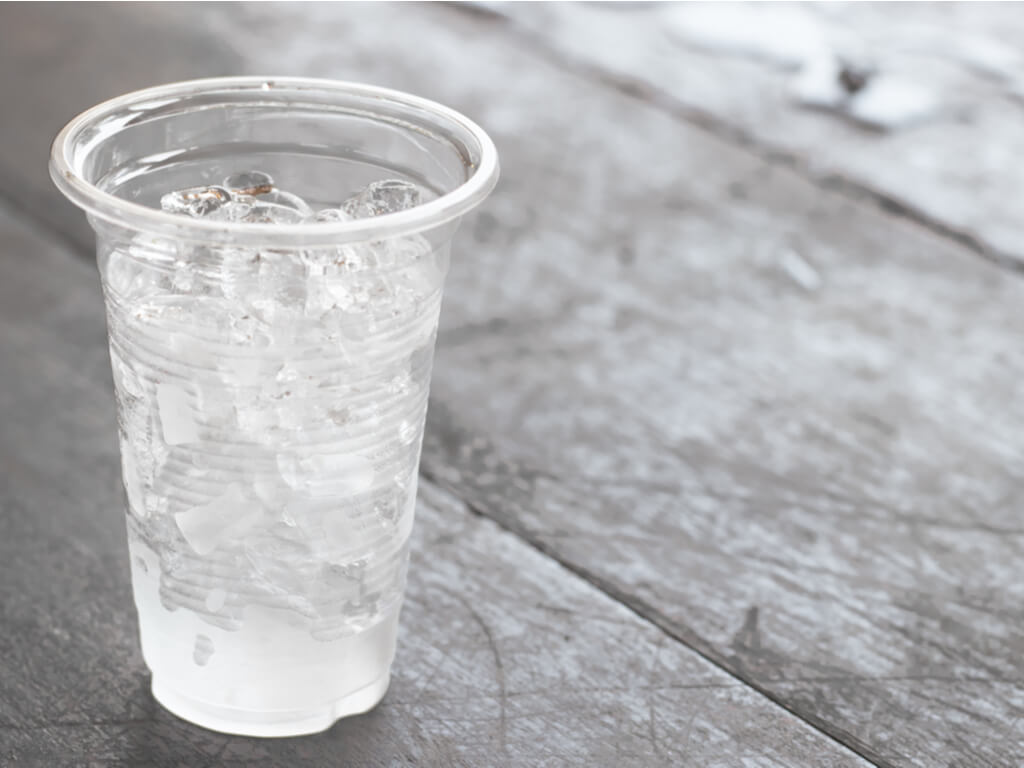
8. Sugary Drinks
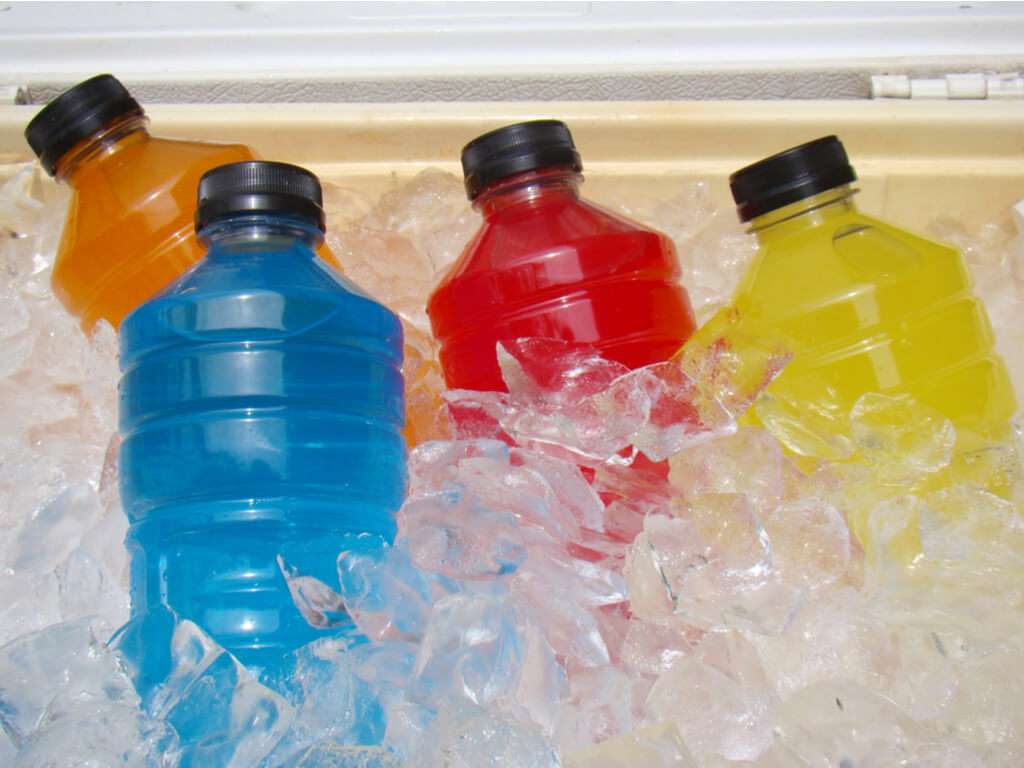
The primary criminal when it comes to oral health is typically sugar. This is because we have a variety of bacteria that hang out in our mouths on a daily basis. When this bacteria eats sugars that are left on our teeth, they release an acid. The acid then wears down enamel, burrowing down into the tooth and creating a cavity.
Keep in mind that the longer the sugar stays on your teeth, the longer the bacteria have to feed off of it and produce acid. That’s why it’s always best to brush your teeth after you eat, and not to snack in between meals.
Food aside, however, there is something even worse for your teeth – sugary drinks – including sugary sport drinks. In addition to sport drinks, juice, full-sugar sodas, cocktails, and sweet teas can all undermine your oral health.
Sports drinks advertise performance to athletes and because of this, people believe that sports drinks are entirely healthy. Although sports drinks can replenish electrolytes and prevent dehydration, they can also damage overall oral health. Much like sodas, sports drinks contain many sugars and acidic byproducts that will erode tooth enamel.
Consider switching to healthier beverage options. Here are some excellent choices:
Water: Always the best option, water keeps your mouth hydrated and helps wash away food particles and bacteria.
Unsweetened Herbal Tea: Unsweetened herbal teas offer a flavorful hydration option without adding sugars or acids.
Coconut Water: Packed with electrolytes, this is a refreshing and natural option low in sugar.
Sparkling Water: Provides the fizz without the sugar, but make sure it is unflavored to avoid acidity.
Kombucha: A great fermented choice that usually comes with lower sugar options but be cautious of its acidity with some flavors.
Electrolyte Powders: Athletes that need to replenish their salts while working out can add sugar-free or low sugar electrolyte powders to their water.
Homemade Sports Drinks: Another great and budget-friendly option for athletes is adding a tablespoon of organic honey, a half teaspoon of pink himalayan salt, and a squeeze of lemon to a large water bottle for a healthy, homemade sports drink.
For those moments when you can’t resist a sugary drink, use a straw to limit the liquid’s contact with your teeth, minimizing potential damage.
9. Sticky Dried Fruits
Dried fruits like raisins, dried apricots, plantains, and fruit leather can be a very healthy snack in a well-balanced diet, but the stickiness of these snacks is not good for your teeth.
Oftentimes these sticky and chewy snacks can get jammed in between your teeth making it difficult for saliva to wash it away. This results in a sugar-loving bacterium that can eat away at your teeth and cause cavities. This is why brushing and flossing your teeth regularly is so important.
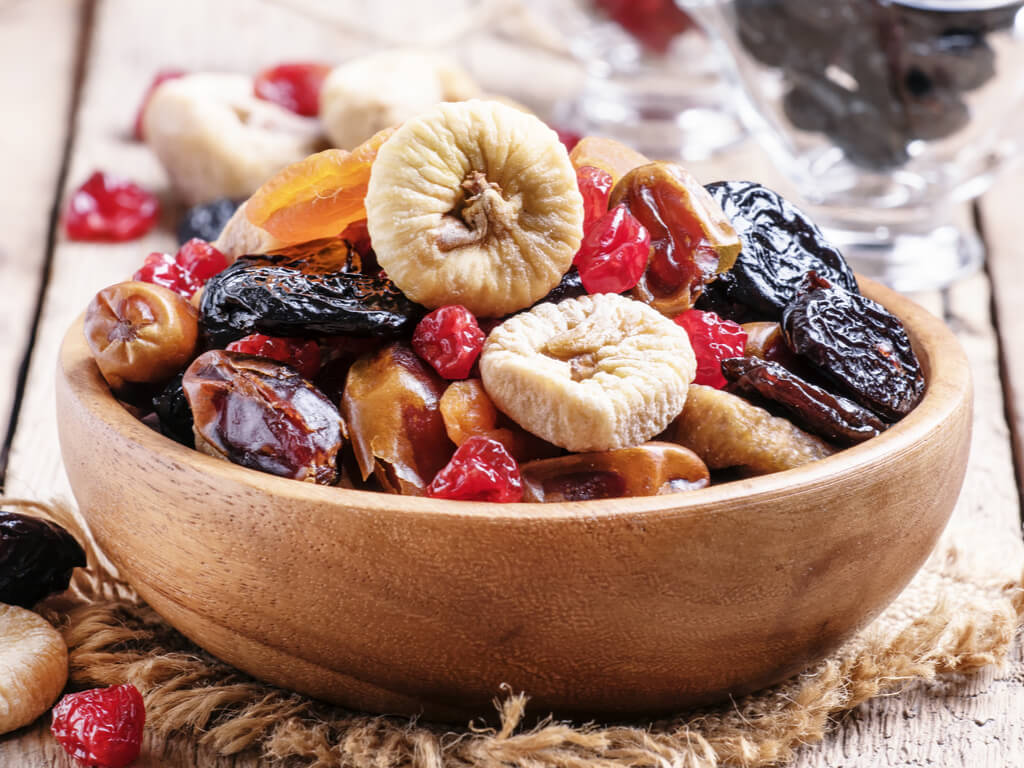
What are the Top Foods for Healthy Teeth?
Now that you have an idea of what foods you should limit or avoid for stronger, healthier teeth, we want to empower you with a list of foods you should enjoy!
Here is our list of the top foods that are great options for teeth health.
-
Apples
Even though the saying goes, “an apple a day keeps the doctor away,” this can also apply to dentists…sort of. Although eating an apple doesn’t replace a thorough brushing of your teeth, it does have some benefits for your teeth. According to a few recent studies, chewing an apple may result in a “reduction in salivary bacterial viability.” In other words, apples can help kill off some of the harmful bacteria in your mouth. So, next time your child is asking for a sweet dessert, try to give them an apple instead of candy. Do keep in mind, though, that all fruit contains some sugar, and you still need to brush your teeth at the end of the day.
-
Celery
Due to its crunchy and low-sugar nature, celery does a good job of brushing off bacteria from your teeth. It’s also high in water content and requires more chewing than most foods, which contributes to an increase in saliva production. Saliva is a natural superhero that washes away food debris and remineralizes your teeth. For adults, this makes celery a low-calorie and tooth-friendly snack!
For children, however, celery may prove to be an unpopular snack. In these cases, a tasty spread like cream cheese or peanut butter can help ease them into this new vegetable. Just keep in mind that a substantial amount of sugars and calories can hide in certain spreads, so always keep an eye on the nutrition label.
-
Leafy Greens
As you may have guessed already, anything with a lower sugar and carb content is better for your teeth. After all, these foods give bacteria less stuff to munch on. This aside, greens such as spinach and arugula are also chock full of nutrients. Calcium and Vitamin C are known to be particularly good for your teeth and gums. Foods with a good calcium content can help strengthen and restore your teeth’s enamel. Folic acid is another part of spinach and leafy greens that works to reduce inflammation of the gums and fight off plaque and other bacteria.
If you’re not a fan of salads, though, don’t worry; you’re not alone. Here’s your tip of the day: Try making a spinach smoothie. You can include fruit such as apples and a splash of juice.
-
Cheese and Dairy
Although this is especially true of hard cheeses, all cheese is high in calcium to some extent. As we mentioned above, a hefty calcium content helps build up the enamel of your tooth and counteracts acids that wear away at your teeth. Cheese aside, other calcium-full dairy foods include milk, yogurt, and cottage cheese.
Milk is great in that it contains plenty of calcium and phosphorus. It also stimulates saliva protection, which helps protect your teeth. Having said that, milk does contain some natural sugars. This means that it’s still a good idea to brush your teeth with a good toothpaste after your morning cereal. It’s also best not to leave small children with bottles of milk for long periods of time for this reason.
-
Protein
Meat may not be the first thing you think of when you think “teeth-friendly,” but you’d be surprised. In fact, beef, pork, tuna, and salmon are all foods that are rich in phosphorus. This mineral is vital to the absorption and utilization of calcium.
If you’re a fan of seafood, then you’re in luck! Fish contains both protein and vitamin D, something that few other foods have. In fact, other than fatty fish, your largest source of vitamin D is most likely the sun. This important mineral aids in the body’s absorption of calcium. So, during those colder months when you may not be getting enough natural sunlight, try to get your fill of salmon, halibut, or sardines. Whether your child chooses fish or the great outdoors, make sure they are filling up on vitamin D to make the most of their calcium intake.
-
Pumpkin Seeds
This one may be a tough sell for your child, but for the baseball moms out there, we recommend trying to get your child to replace chips with an equally tasty bag of pumpkin seeds.
Similar to meat, pumpkin seeds are high in phosphorus and allow the body to better absorb other important vitamins and minerals. Phosphorus also supports tooth enamel and helps hold your teeth in place. Another vital nutrient in pumpkin seeds is zinc. Just 1 oz of pumpkin seeds will give you about 2.21 mg of zinc. This mineral strengthens your bones and improves your gum health, too! Other non-dental benefits include a stronger immune system, healthier hair, and better digestion.
Around Halloween, you can also take the seeds from the insides of your Jack-o-Lanterns and bake them, making a nice addition to a meal or just a snack. Pumpkin seeds are also great additions to trail mix if you like to go on picnics, hikes, or long walks any time of the year.
-
Oranges
High in vitamin C, oranges help build stronger blood vessels and reduce inflammation that could irritate your child’s gums. Vitamin C is also a key component of your body’s ability to produce collagen, a protein that deters periodontal disease and sensitive gums. Oranges also contain B vitamins, which promote healthy connective tissue. So, by eating oranges, you and your child will be getting at least two important nutrients that will improve your overall oral health.
-
Berries
Like any food high in antioxidants, berries are an overall healthy choice. Antioxidants are particularly good for the mouth, however, as they kill bacteria that could lead to inflammation and tooth decay. Antioxidants also keep your mouth safe from cell damage and infections.
-
Sweet Potatoes
One of the sweeter options on our list is sweet potatoes, which contain high amounts of vitamin A. Vitamin A helps with the growth and repair of tissue and contributes to saliva production. Additionally, vitamin A helps promote and maintain healthy Keratin levels. Keratin is a protein that supports healthy hair, skin, and nails.
Vitamins and Minerals For Healthy Teeth
Now that we’ve established some foods to incorporate for healthy teeth, let’s get down to the meat and potatoes. Here are some common vitamins and minerals that are necessary for a set of healthy teeth.
Calcium
According to the ADA (American Dental Association), “calcium strengthens the hard outer shell of your tooth”, thereby protecting your teeth against cavities and other damage.
Phosphorus
According to Colgate, this mineral helps the body “absorb and use calcium and strengthens teeth by protecting and rebuilding tooth enamel”.
Fluoride
Fluoride is an extremely important mineral that helps strengthen the outer enamel of your teeth, making your teeth more resilient to caries.
Teeth Friendly School Lunches & After School Snacks
As a parent, it can be challenging to find a grocery list that focuses on teeth friendly school lunches and snacks for your children! We curated a list of the top options that focus on vitamins A, C & D, as well as protein for better teeth. Add these foods to your next grocery list:
- Aged cheese such as cheddar cubes or Swiss string cheese
- Regular hummus or sweet potato hummus with carrots and celery
- Hard boiled eggs
- Small handful of almonds
- Low-sodium veggie (broth based) soup in a thermos
- Tuna salad sandwich (easy on the mayo)
- Little clementines or tangerines (avoid eating too many acidic foods)
- Yogurt-based dip with cucumbers, broccoli, and bell peppers
- Roasted chickpeas
- Lettuce wrap with grilled chicken and avocado
- Low sodium turkey or chicken from the deli or home cooked
- Kettle popcorn (no butter necessary)
- Avocado on whole wheat toast
- Baked fruit chips like bananas or apples
- Baked veggie chips like kale, zucchini, or sweet potatoes
- Berry smoothie (skip those ice cream loaded milkshakes)
- Melon (use a fun shaped cookie cutter or melon baller)
- Nut butter on celery
- Homemade applesauce (a cinch to make in the crock pot)
Finals Tips on Selecting the Right Foods for Healthy Teeth
Here are some tips to help you keep your teeth healthy for life! Combining regular dental care habits with smart dietary choices can significantly reduce plaque buildup and maintain your oral health:
- Brush Regularly and Properly: Make sure to brush your teeth at least twice a day with fluoride toothpaste. Focus on brushing all surfaces of your teeth, including the gum line, to effectively remove plaque.
- Floss Daily: Flossing is crucial for reaching areas between your teeth that a toothbrush can’t access. Floss every night to remove any lodged food or dental plaque that has built up in between your teeth.
- Timing and Technique: Contrary to popular belief, brushing right after you eat acidic food can speed up wear on your teeth because your enamel is already soft from the acid. Whenever you have an acidic food or beverage, rinse your mouth with water to remove some of the residue left behind.
- Dietary Choices:
- Eat acidic and sugary foods as part of a meal instead of on their own.
- Limit snacking on sugary and acidic foods.
- Water and coconut water are healthy alternatives to beverages with high levels of sugar and acidic byproducts.
- Try to use a straw when drinking coffee, wine, or soda to minimize contact with your teeth.
- Hydration and Protection:
- Remember to drink plenty of water and use oral hydration solutions or mouthwash to maintain a hydrated mouth.
- Ice can be used to cool down a drink, but refrain from chewing on it. Instead, you can opt for a chilled drink with no ice.
By combining these practices, you can effectively reduce the negative effects of food-related plaque buildup and keep your smile bright and healthy.
Balance and Moderation
Above all, it’s important to eat a balanced diet that keeps your body healthy all around. Don’t try to load up on just the fruits and veggies that are good for teeth – load up on all the fruits and veggies that your organs need.
If you’re ever unsure about what you should be eating, feel free to consult with your primary care physician and dentist. They’ll have plenty of great eating tips to get you on the right track.
Also, remember not to skimp out on your annual physicals and biannual dental check-ups. Even the best oral habits still need a little help sometimes. After all, you never know what plaque might be hidden on your back teeth.
You’ve heard people say, “everything in moderation,” so be careful not to turn a cookie monster into a sugary fruit monster. Just to be safe, skip the sticky stuff. It isn’t the good kind of chewy that we are looking for in teeth friendly foods. Raisins may seem like a healthy treat, but dried fruit are extremely high in sugar, just like most fruit juices from concentrate. Yikes! Wash away the gunk, and get your child in a good habit of drinking water. It may be too boring for some, so add citrus, berries, mint, or even cucumber! Even adults want to enjoy eating and drinking healthily.
Why Are Regular Dental Visits Crucial for Maintaining Dental Health?
Regular dental check-ups play a vital role in preserving oral health, extending far beyond just a clean smile. Here’s why you shouldn’t skip them:
- Early Detection of Problems: Dentists can identify potential issues, such as tooth decay and cavities, at an early stage. Spotting these problems early helps prevent them from developing into more serious conditions that may require complex treatments.
- Comprehensive Cleaning: Even with diligent brushing and flossing, plaque and tartar can build up in hard-to-reach areas. Professional cleanings during your dental visits remove these buildups, reducing the risk of gum disease and keeping your mouth fresh.
- Oral Cancer Screenings: Routine dental visits include screenings for oral cancer, a critical step that can be life-saving. Detecting signs of cancer early significantly improves treatment outcomes.
- Gum Disease Prevention: Dental professionals assess the health of your gums, providing advice and treatment plans to ward off gum disease or manage it effectively if it’s already present.
- Education and Advice: Dentists offer personalized guidance on proper brushing and flossing techniques, as well as recommendations for products that could enhance your oral care routine.
Incorporating these appointments into your schedule is a proactive approach to maintaining your dental health, ensuring that small issues don’t turn into major concerns. Prioritizing these visits can save you time, discomfort, and expense in the long run.
Teeth Health and Diet FAQs
How Do I Keep My Teeth Healthy?
Keeping teeth healthy mostly comes down to one thing – good habits.
Daily brushing, flossing, and mouthwash are the basis of a healthy set of teeth and gums. It’s also essential to do these steps properly. Try to brush your teeth thoroughly, and floss all the way through in between the teeth. When selecting a brush and toothpaste, ask your dentist for a recommendation – they will most likely know what’s best for your teeth.
As for those times when good habits just can’t keep all the cavities away, your dentist will be your safety net. Biannual check-ups allow your dentist to clean any leftover plaque gathering around your teeth, and inspect for any possible issues.
During a check-up, your dentist can look for cavities, impacted wisdom teeth, thinning enamel, gum disease, and other common dental problems.
How Do Cavities Form?
As you might have already guessed, most of the foods on this list are going to be the things that encourage tooth decay and gum disease. In order to understand that, you’ll want to know how cavities form.
Generally speaking, we all have some bacteria in our mouths at any given time. Even so, you don’t want too many harmful bacteria, and you definitely don’t want to feed the bacteria. Bacteria can feed off of sugars and produce a harmful acid. As this acid wears down your enamel, dental decay can start to form. The longer you leave the dental decay (cavity) alone, the higher the probability of it burrowing down even deeper into the sensitive parts of your teeth.
In order to prevent these cavities, you want to avoid letting sugary foods hang around your mouth for long periods of time. Also, you’ll want to brush twice a day to clean away the bacteria that is there.
Visit Snodgrass and King Dentistry for Healthy Teeth
For quality dental care in the greater Nashville Area, come visit Snodgrass-King Dentistry. We have offices in Davidson County, Williamson County, as well as in Murfreesboro! We’re both a pediatric dentistry practice, but we also see adults.For adults, our dental clinics also offer services such as implants, fillings, crowns, veneers, and even extractions. Whatever your health concern is, we’ve got you covered.
Our dentists are specially trained in pediatric dentistry and have decades of experience under their belt. They’ll make sure that your child is as comfortable as possible throughout their visit.
Simply call or fill out our online form to book your first visit. You’ll be able to find all our new patient forms here on our website. And be sure to check out our new patient specials! We look forward to meeting you.


